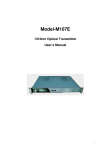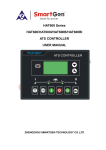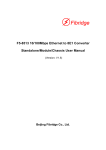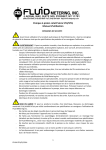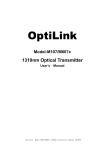Download User`s Manual
Transcript
FOREWORD This manual is applicable to the Thor Series F-RF 1310nm Transmitters for 900 MHz signals. This guide describes the product's function characteristics, technique parameters, installation and debugging procedures. For insuring the equipment can be successfully installed and safely work, please carefully read the manual before using this equipment, and adhere strictly to the prescriptive operation steps of this manual for installation and debugging. This will prevent unnecessary damage to the equipment or harm to the operator. If there is question, please contact Thor directly. Special Notice: 1. 2. 3. 4. The optical transmitter is professional broadcast equipment, and its installation and debugging must be performed by special technician. Users should read this manual before operating to prevent damage to the equipment by faulty operation or human injury. There is invisible laser bean from Fiber output, which if direct shined at eyes will cause permanent damage. Earthing first before turning on the power and being sure that the rack mount and the outlet are earthed as well (Earthing resistance should be less than 4Ω), will prevent damage to the laser by static. For insuring the equipment can work stably for the long-term, please insure that the input voltage is of a stable waveform, in some cases it may be necessary to use a UPS power supply to provide constant and steady power. The environmental conditions are also very important for the longevity of the equipment. Ideal conditions are 25 degrees Celsius with low humidity. 1 1. Product Summary Thor F-RF series laser transmitters are used to create CATV HFC networks, and primarily are used for TV video signal, digital TV signal, telephone voice signal and data (or compressed data) signal long-distance fiber transmission. This product uses high performance DFB laser transmitter as the light source. Our RF drive adopts RF power digital automatic process techniques and advanced RF pre-distortion circuit developed by our company. A built-in microprocessor automatic monitoring system insures the system functions stably. 2. Functional Characteristics 1. Based on a high performance DFB laser with a narrow spectrum, good linearity and high output power. 2. RF drive adopting RF power digital automatic processing techniques, can according to the level of input RF signal and number of channels (15-84channels), automatically process drive level power, making the C/N, CTB and CSO always in best worth, insure product function; and be steady of output level. 3. Advance multi-frequency RF pre-distortion technique with an arsenide kalium component drastically improves CTB and CSO, the most important parameter of CATV, and heightens C/N at the same time. 4. Built-in microprocessor automatically monitors circuitry and can in real-time accurately monitor optical output power and temperature of the laser to insure stable optical output power, and prolong the working life of the laser. 5. Built-in blue VFD monitor on front panel can accurately display the equipment's working status and parameters. 6. 19″ 1U height standard rack mount, equipped standard IEEE802.3 10Base-T Ethernet network port and RS232 network port, can monitor equipment status in real time through the network. 7. Support GB/T 20030-2005HFC Network control management protocol 3. Principle Drawing 4. Technique Parameter 4.1 Link path test condition Special Note: Equipment technique parameters in this manual are given according to the test methodology of GY/T143-2000 CATV system amplitude modulation laser transmitter and receiver enter the net technique condition and measure method, and gained under its prescriptive test condition. 2 Test conditions: Test link path is formed of standard fiber and standard optical receiver. Under the condition of prescriptive link loss, set 84 PAL-D test source TV channel signals at 750MHz, when optical receiver input optical power being -1dBm, measure C/ CTB, C/ CSO, C/ N. 4.2 Technique Parameter Table Item Unit Technique Parameter Optical Power mW 4 6 8 10 12 14 16 18 20 22 24 26 Optical Link Path Loss dB 7 9 10 11 11.8 12.5 13 13.6 14 14.4 14.8 15.1 Optical Wave Length Nm 1550±20 Type of Laser DFB Optical modulation mode Direct Optical Intension modulation Optical connector Type FC/APC, SC/APC Frequency Range MHz 47-750/862 RF Input Level dBuV 72-88 Flatness In Band dB ±0.75 RF Input Impedance Ω 75 Input Reflection Loss dB ≥ 16(47-550MHz) ; ≥ 14(550-750/862MHz) C/CSO dB ≥ 60 C/CTB dB ≥ 65 C/N dB ≥ 51 AGC Control Range dB ±5 MGC Control Range dB 0-10 Power Voltage V AC 110V-250V(50Hz or 60Hz) Power Consumption W 30 Operation Temperature ℃ 0 -- 45 Store Temperature ℃ -20 -- +65 Relative Humidity % Max 95% no condensation Dimension mm 483(L)×380(W)×44(H) Optical Link Path C/N Parameter: Optic power 4mW 6mW 8mW 10mW 12mW Optical Loss(dB) 4 5 6 7 8 9 10 11 12 53.8 52.8 51.8 51 50.1 49.2 48.2 53.0 52.0 51.0 52.8 50.1 49.1 48.1 51.9 51.0 50.1 49.2 48.2 52.9 51.9 51.0 50.1 49.1 48.2 52.7 51.8 50.8 49.9 49.0 48.0 52.4 51.5 50.5 49.5 48.6 14mW 3 13 14 15 16 47.8 17 18 16mW 52.0 51.0 50.1 49.1 48.1 18mW 52.5 51.6 50.6 49.7 48.7 47.9 20mW 51.9 51.0 50.0 49.0 48.0 22mW 52.2 51.4 50.4 49.4 48.6 47.8 24mW 51.5 50.3 49.2 48.5 47.7 26mW 51.5 50.2 49.2 48.5 47.6 5. Exterior function explanation 5.1 Front panel description Front panel sketch map 1. Power indicator: when the power inside is working, the light is on. 2. Equipment operating indicator: equipment works: LED blinks by 1Hz frequency. 3. LD laser operating status indicator: red light shows that the laser does not work and each parameter is normal; when the red light is flashing, it shows that this equipment is at fault. The faulted reason can be looked up in the alarm list of the show menu. When the green light is on, it shows that laser is working normally. 4. RF status indicator: Green light: normally operation; Red light: laser abnormity. 5. The 160×32 crystal liquid display: this displays all parameters. 6. Withdraw or cancel key. 7. Up and increase key. 8. Down and decrease key. 9. Confirmation key 10. Laser switch key: Control work status of the laser. “ON” indicate laser is turn on, “OF” indicate laser is turn off. When powering on the unit, the key must be OFF, after power on self test, the laser can be turned on when the display indicates the unit is ready. 11. Input RF signal Test port: -20dB RF Test Port 5.2 Back panel explanation Back panel elucidation 1. 2. 3. RF input RS232 interface: use for various network management parameter allocations. LAN interface: match with IEEE802.3 10Base-T interface, use for network management. 4 4. 5. 6. Optical signal output: Optical signal output port has two interfaces: FC/APC and SC/APC. There is invisible laser bean from Fiber output when laser works, which direct shining at eye will cause permanence burn. Power in Case Earthing: Connection the equipment and earth. 5.3 Display Parameter Explanation 1) Lock is off 2) Lock is on 3) Enter the system Current Input optic power and output optic power 4) Push ENT key into menu 1. Parameter menu 2.Setting menu 3. Alarm menu 5) Sub-menu of parameter Push ENT key into menu Content Function Laser Output Laser Bias Laser Temperature Tec Cooling RF Channel Number 5 Input RF RF Control Mode AGC Ref MGC ATT +5V Read -5V Read +24V Read S/N Box Temperature IP Address Subnet Mask Net Gateway Mac Software Version 6) Setting menu 6 Push ENT key into menu Content Function Set Laser Output Unit Set Buzzer Alarm Set RF Control Mode: AGC or MGC Set MGC ATT Set AGC Ref Set Channel Number Set RF Input Low Alarm Set RF Input High Alarm Set Laser Output Low Alarm Set Laser Output High Alarm Set Laser Temp Low Alarm Set Laser Temp High Alarm 7 Set +5V Low Alarm Set +5V High Alarm Set -5V Low Alarm Set -5V High Alarm Set +24V Low Alarm Set +24V High Alarm Set Local IP Address Set Subnet Mask Set Gateway Restore Factory Config 7) Alarm menu Push ENT key into menu 8 7. Installation and Debugging 7.1 Unpack and Check 1. Insure the package not is defaced. If have any damnification or water mark, please contact local franchiser or conveyancer. 2. After unpacking, check equipments and accessories according to package list. Any question, please contact local franchiser or our company. 3. If you think equipment has been damaged, please don't electrify avoid worse damage. Please contact local franchiser or our company. 7.2 Instruments and tools An optical power meter A digital multimeter A standard fiber test jumper (FC/APC or SC/APC) Some waterless alcohol and nosocomial degrease cotton 7.3 Installation steps 1. Before installing the equipment, please read the operation manual carefully and install the equipment according to the operation manual. Notice: install the equipment is not according to the operation manual, which leads to man-made faults and other results, our company will not take the responsibilities and the service of free fix. 2. Fix equipment on rack mount and earthing. (earthing resistance <4Ω). 3. Check voltage by digital multimeter whether accord with requirement and to be sure laser lock is OFF. Then turn on power. 4. Connect RF signal and turn key to ON, till laser work LD turns to green, then the equipment began to work. This time you can push STATUS keys on front panel to watch parameters. 5. Connect optical power meter to optical output of the equipment with a standard test jumper, then measure optical output power, affirm optical output power is same to value shown on front panel;(when test the optic power, ensuring the optic power is within 1310nm. Ensure fiber test jumper is standard fiber test jumper, and each active Connector is not polluted), remove standard fiber test jumper and optical power meter; connect the equipment to network. The equipment has been installed. 8. FAQ Breakdown Problems Breakdown cause Resolution method Check power supply whether After turn on the power, VFD monitor and LED no display. Switch power can’t normal start, equipment DC power supply abnormal. After turning on the power, VFD monitor has no display, but power LED is on. Micro-processor doesn’t work. 9 normal(~AC160V~250V), if power voltage normal, maybe switch power module fault, contact franchises or our company. Please contact with the dealer or our company. After turning on the power, output optical power displayed on the front panel and laser status LED are normal, but real tested output power is on the low side After connecting to network, figure of optical connector has obvious netlines or big optical point After connecting to the network, figure of optical connector has obvious noise problems After connecting to network, figure of some optical connector channel has obvious noise point or ripple 1. 2. 3. Test jumper quality not good Optical active connector or adapter maybe polluted China tube in adapter maybe damaged 1. Receive optical power at optical connector too high, result in output level of optical receive module too high, RF signal inter-modulation index become worse 2. RF signal of input optical transmitter higher than the AGC control range, result in inter-modulation index become worse. 3. Inter-modulation index of input optical transmitter RF signal in originally bad. 1. Change good test jumper. 2. Clean polluted fiber active connector or adapter. Detailed operation method refers to “optical fiber active connector clean and maintenance method”. 3.Change damaged adapter 1. 2. 3. Check optical receive power of optical connector and adjust properly Check input level of optical transmitter RF signal and adjust to the range that equipment required.(Right RF input level is 72-88BuV) Check inter-modulation index of input optical transmitter RF signal 1. Optical connector receives optical power not enough cause C/N drop 2. RF signal level of input optical transmitter too low, result in laser modulation depth not enough. 3. System link path C/N too low 1. Clean fiber active connector or adapter to ensure optical connector receives optical power. For detailed operation method refer to “optical fiber active connector clean and maintenance method” 2. Check RF signal level of the input optical transmitter and adjust to the range that the equipment requires (72-88dBuV). When number of input channel less than 15, setup NGC control mode 3. Check C/N of system link with frequency analysis instrument and adjust properly to insure C/N of link signal higher than 51dB There’s open circuit interfere or strong interfere signal invade in optical connector. 2. 1. Check if there’s a strong signal origin at the optical connector’s place to avoid strong signal interference. Check cable road below optical connector whether there’s shielded net or bad shield of RF connector 10 3. Close the units cover to insure good shield. If possible, set shielded cover at optical connector and earthing the shielded cover After connecting to the network, the optical channel has obvious noise problems. C/N ratio index of some channels too low Check C/N ratio of the channel signal and do some proper adjustment. After connecting the equipment, the signal has obvious noise problems Interference of power alternating current wave caused by bad equipment earthing or power supply problems. Check the equipment’s earthing, insure every unit on the rack has good earthing with resistance <4Ω. After connecting equipment, received optical power at optical connector is abnormal. Output RF signal is also not standard, but output optical power is normal 1. Optical fiber active connector wrong matched. Maybe APC connector match PC connector, under these conditions there are optical reflections. Optical active connector or adapters were badly polluted, or adapter was damaged. 1. Check type of optical fiber active connector, choose APC connector to insure optical signal transmits normally. 2. Wash polluted optical active connector or adapter. Detailed operation method refers to optical fiber active connector clean and maintenance method. 9. Service a) Our company's promises: Guarantee for thirteen month (start from the production date showed on S/N ), we will fix any equipment problems. If the fault is found to be caused by user error, there may be a charge for these repairs. b) If the equipment at fault, immediately contact local distributor or our company customer service centre. c) Equipment at fault that is repaired locally must be fixed by a special technician to avoid further damage. d) Special caution: if the user has altered the equipment, our company will not offer free repair. We will repair the equipment, but the end user is responsible for cost. The clean and maintenance method of the head of fiber active connector During the operation of optical equipment, each active fiber may be polluted by dust or dirt, resulting in optical link path loss. If optical receive power and output level of the receiver decline, you should clean and maintain active fiber connector. Introduce some clean methods: Carefully screw off the active fiber connector from the adapter. Take care to avoid aiming at the human body or eye, this can result in harm to the body. 11 Use degreaser or alcohol cotton to wash carefully, after finishing let the surfaces dry for two to three minutes before reconnecting. Cleaned optical active connector should be connected to optical power meter to measure out optical power, to confirm that it has been properly cleaned. When the cleaned optical active connector screwed back to adapter, care should be taken to avoid damaging the connector with excessive force. The fiber active connector should be cleaned in pairs. If optical power is on the low side after cleaning, the connector on the other end of the fiber may need to be cleaned. Use compressed air or degrease alcohol cotton to wash the adapter carefully. When using compressed air, aim the muzzle at the tube of the adapter to clean off any dust. When use degreasing alcohol cotton, wiping motion needs to be consistent, otherwise the connector won’t be properly cleaned Special notice: a. In the process of cleaning the fiber optic connector, you should avoid direct exposure to the eye, which will cause permanent damage!!!! b. Use proper force to install the fiber optic active connector, or the ceramic tape in the adaptor will lead to failure. Once the ceramic tape is broken, the output optical power will decrease rapidly. If you turn the fiber optic active connector slightly, the output optical power changes obviously. c. Please operate the optical fiber under the condition of close the pump laser. Or the big output power will lead to burn the joint of the output optical fiber, which will reduce the output power. 12















